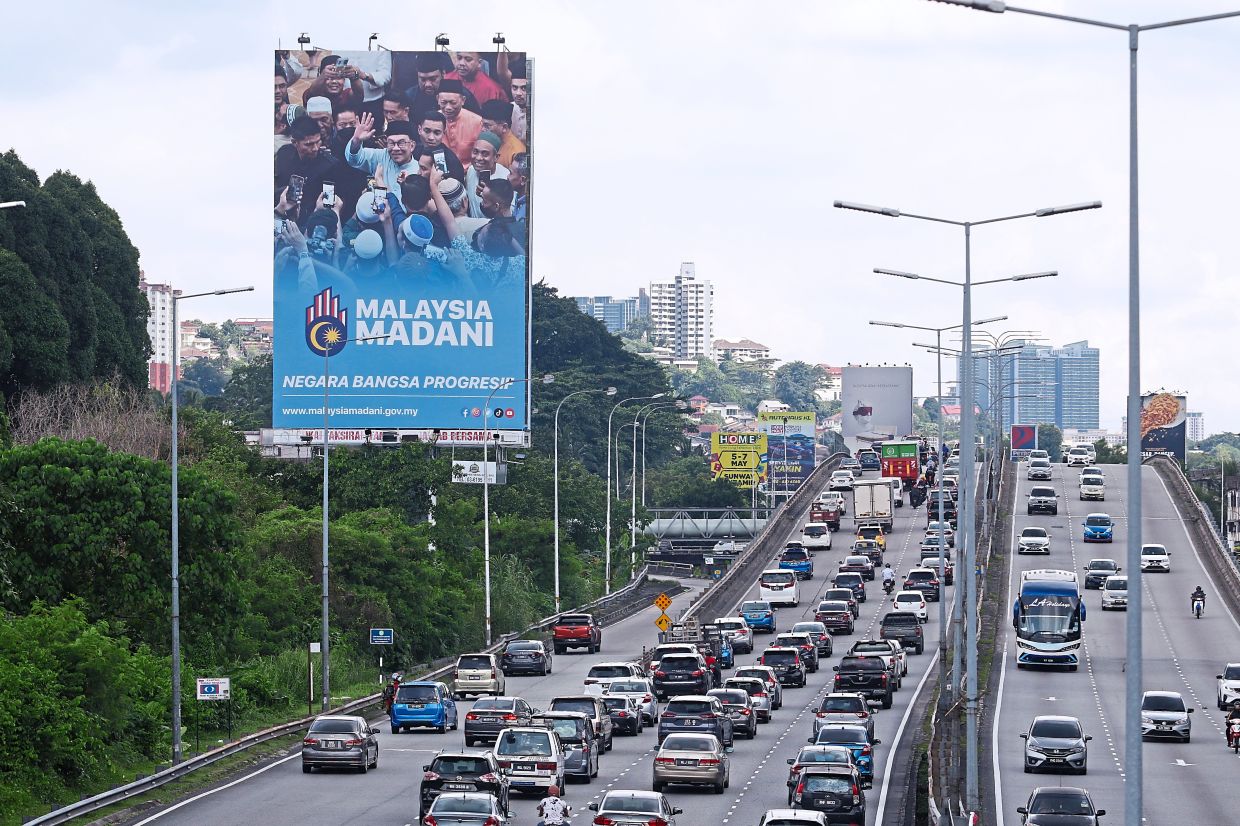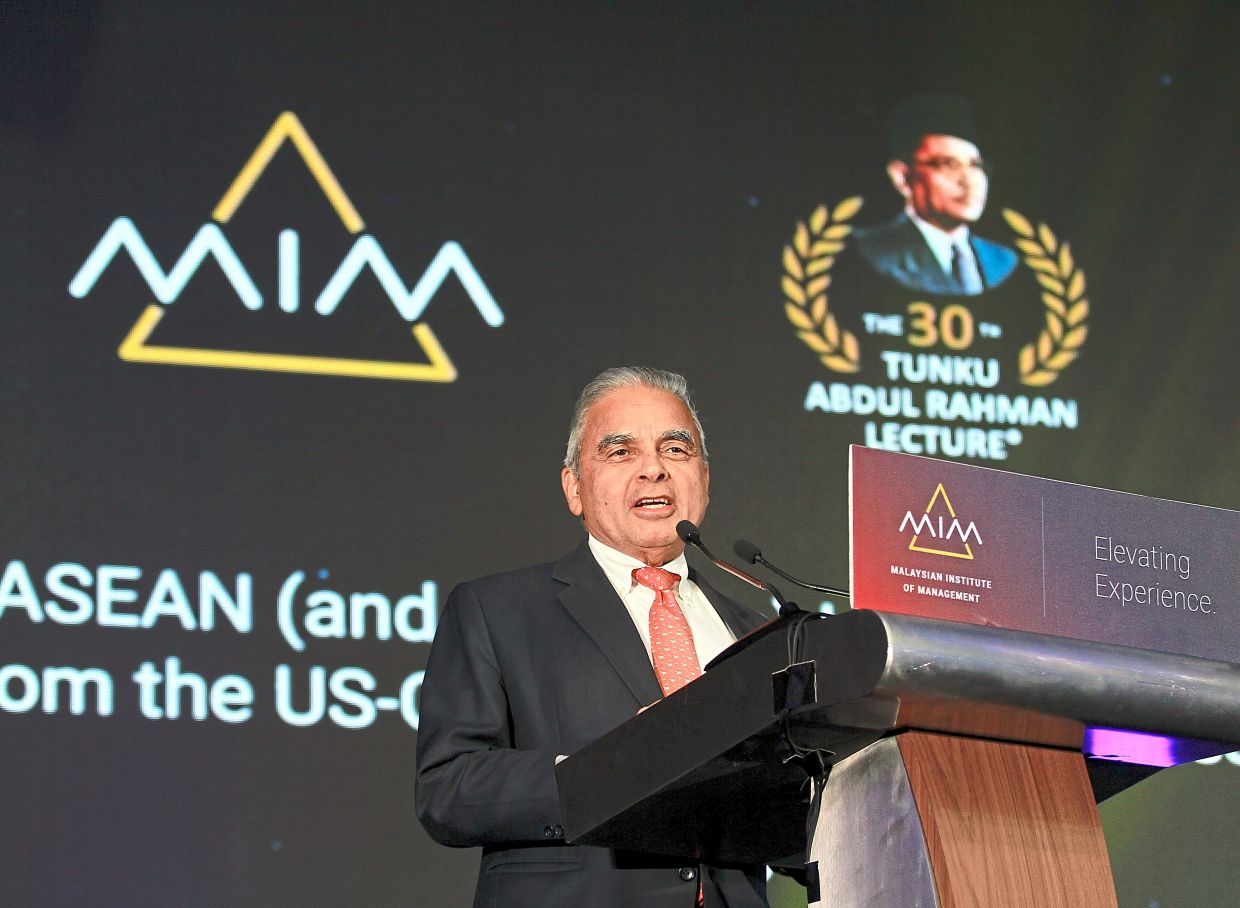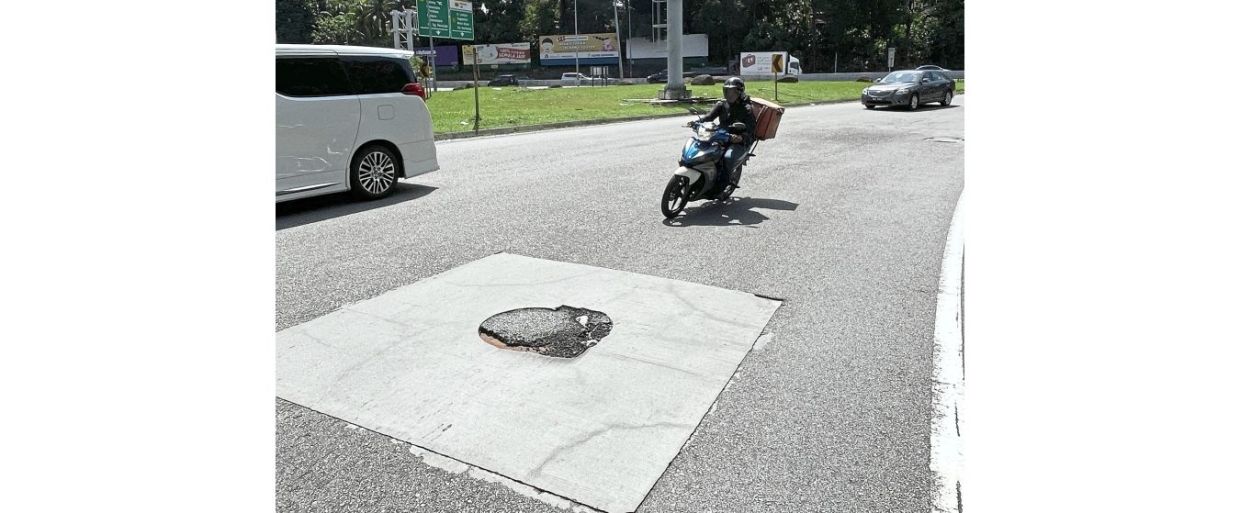

SEXUAL assault is a subject that most Malaysians prefer not to delve into, even if this particular topic is a work of fiction for a film production, as many of us find the subject, frankly, disturbing.
There is a degree of uneasiness over how such a subject with much social stigma here should be tackled sensitively.
So, for many, the easiest way is to avoid it completely.
Unfortunately, sexual assaults, or more precisely, rapes, take place almost every day in Malaysia.
In fact, there are an average of five rape cases reported daily in Malaysia, according to the Journal of Humanistic Psychology.
A compelling and educational drama is finally on our mini screens, with female voices taking the lead.
Liar, a television series produced by Astro Shaw, is a story of a divorced teacher, Lara Sulaiman, who goes on a date with a single father and well-known surgeon, Dr Aiman Yusuf.
He seems like the perfect gentleman – handsome, affluent, educated, witty and well-mannered.
But the relationship takes a disastrous turn after Dr Aiman takes Lara home.
She suddenly feels sick, and by the next morning, she just knows she has been sexually assaulted.
She accuses him of raping her; he naturally denies it, and without any real evidence, Lara faces a wall.
Her family members are also apparently unsupportive of her “baseless” actions in pursuing justice, preferring to have her just move on and forget about the incident that also affects them.
I won’t go any further, as I don’t want this to be a spoiler. I have watched six episodes, and I thought the finale was here. But Astro has told me there are six more shows to go.
Like most of Astro Originals productions, such as Kuasa and Kudeta, the setting is urban, and the dialogue is a mix of Bahasa Malaysia and English, with a multi-racial cast.
So is the production team, with Lim Siu Min as executive producer and Jason Chong and Imri Nasution as co-directors.
Liar is an adaptation of a British thriller of the same name, and Astro has acquired the rights to this Bafta-nominated drama.
The cast boasts the likes of Tiz Zaqyah and Tony Eusoff.
It is not often that local film producers provide a voice for women in Malaysia.
We still deal with gender biases here, let’s face it.
Women are often the ones blamed for rape, an unfair accusation initiated by conservative politicians who think that the way a woman dresses is a contributing factor.
Some even point the finger at “actions” by the women that purportedly send the wrong message to the men.
But the reality is that, according to a 2022 news report, children and teenagers aged between 13 and 18 make up the biggest number of rape victims in Selangor.
Here’s the punchline to these accusers – the victims did not dress provocatively.
Another news report said that date rape is also high, with 60% of it happening during dates, and like Liar, it is hard to prove, especially when victims tend to clean themselves up after such assaults, believing it will wash away the shame and “dirtiness’’ they had just gone through.
But it also means they unwittingly remove the precious evidence away.
In most rape cases, the victims know their predators, and sometimes these may include their own family members.
Researchers Janet Ann Fernandez and Azmanwaty Mohamad Nor, in their article, rightly opined that “the problem lies not in the hands of an individual or a few misogynistic men but in society”.
“It lies in the mindset of the people, and every one of us is taking part in rape culture by endorsing rape myths.
“Rape myth acceptance within Malaysian society encourages sexual assaults or sexual violence.
“Some of the popular rape myths include: the victim’s clothing choice, the victim’s emotional reactions, the presence of physical injuries, rape occurs between strangers, women lie about rape, and men cannot be raped.’’
Astro Shaw, together with Double Vision and All3Media International, deserves to be commended for its willingness to take up this issue.
In the words of Astro Shaw’s head, Raja Jastina Raja Arshad, Liar is a gripping story that explores gender politics, sexual harassment, mental health and deceit, which are rarely addressed on our screens.
I am not lying; it’s a good TV series. Don’t miss it.

Setting things right: A Malaysia Madani billboard along the MRR2 highway. However, the Prime Minister has learned that there are many unnecessary billboards featuring him – erected using public money – all over the country, and has called for a stop to the wasteful splurge. – IZZRAFIQ ALIAS/The Star
THE Prime Minister has certainly set things right by calling for a stop to billboards with his face on them.
Surely all of us know what Datuk Seri Anwar Ibrahim looks like, so there’s no need to splurge taxpayers’ money to compete with cosmetic ad models and tuition teachers along the highway.
Last week, he complained that while on his way to Alor Setar for a Hari Raya open house, he learned about the billboards featuring him all over the country.
The billboards, he said, had been erected by government departments using allocations from the previous government.
Well, it doesn’t matter if the money is from the budget of the past government. The bottom line is, there’s absolutely no reason to use the money to serve our political leaders’ narcissistic needs.
It’s good that Anwar pointed out the money allocated for these billboards should be put to better use.
These government bodies must have presumed that they were doing the PM a favour and wanted recognition for their contributions by buying space on these billboards.
But it isn’t just the PM who’s glorified. There are billboards of other leaders including Cabinet Ministers, Chief Ministers, state executive councillors and elected representatives all over the place, too, sometimes, even on bus stands.
It’s perfectly understandable if such billboards were part of an election campaign because voters need to be reminded of politicians’ presence.
Then there are the banners put up during festivals to greet their constituents. They are certainly acceptable, but please direct the contractors to remove them after the celebrations are over.
These banners invariably become eyesores, yet no one seems to take them down, not even the local authorities whose tasks include tearing down illegal advertisements.
But the heart of the problem about using public funds for billboards lies in the long standing bodek culture afflicting Malaysia.
It’s unfair to just blame the civil service for wanting to gain favours from their superiors, including political leaders.
Pathetic as it may sound, some would have thought that putting up billboards would be a way to gain brownie points.
One writer aptly described this currying favour practice as “the greatest single organisational dysfunction within Malaysia’s civil service, compromising the quality and integrity of management along with protection against corruption.”
Strong words. Perhaps even out of line, but a new political culture is surely needed.
Our federal ministers, for a start, should direct government officials under their respective ministries to dismiss the practice of grand receptions when they attend meetings.
It’s inexplicable why so many officials should stop work just to greet and smile at a minister, or their deputies for that matter.
Malaysians would also like to see ceremonies become short and precise.
It’s criminal for civil servants and invited guests to be spending half the day attending unproductive events, which mostly entails listening to a VIP.
Ministers and their deputies are merely performing their duties and while we respect our leaders, nothing comes out of unnecessarily elevating the status of politicians.
For a start, some politicians can discard the need for travelling with an entourage, which often includes political hangers-on. It’s nothing more than a grandiose display of self-importance.
The old politicians, or commonly known as party warlords, are the worst of the lot. They enjoy travelling in a convoy of Alphard and Vellfire vehicles, or their equivalents.
And certainly, the entitlement of police outriders and even council outriders, must stop. These ingratiating, servile culture and pompous, egotistical practices must cease.
Then, there are those who insist that their titles must be properly addressed or else they’d be offended.
I’ve said enough of our rituals of addressing every Tan Sri, Puan Sri, Datuk Seri, Datin Seri, Datuk Datuk and Datin Datin. That’s practically everyone in the room.
Our obsession with titles and honorifics to earn respect and public standing has really gone overboard. Too many people are flaunting titles they don’t deserve.
No wonder there are Malaysians who are freely parading titles even if it’s an offence.
The PM started his political career in the 1970s, insisting that he should be addressed as just Saudara Anwar Ibrahim.
We need a fresh political culture where YBs are elected to do their work and not expected to be revered.
A new political culture is surely needed.

Insightful views: Kishore giving his assessment on the US-China rivalry during his lecture in Kuala Lumpur.
International relations expert Kishore Mahbubani has interesting views on US-China rivalry and the role Asean could play.
IT’S not every day that one gets to hear directly from Prof Kishore Mahbubani, one of the best thinkers on international relations.
In fact, it had taken the organiser, the Malaysian Institute of Management, over two years to invite the Singaporean diplomat, academician and best-selling author to Kuala Lumpur.
Those of us who turned up for his lecture on Tuesday evening wanted to hear his assessment of the United States-China rivalry, which is certain to get worse in the coming years.
Kishore is a Distinguished Fellow at the Asian Research Institute, National University of Singapore, and has had two notable careers – 33 years in diplomacy and 15 years in academia.
He was the founding dean of the Lee Kuan Yew School of Public Policy and spent over 10 years as Singapore’s ambassador to the United Nations.
He has authored several books, including best-sellers such as Can Asians Think? and Has The West Lost It?. His insightful views on the US-China geopolitical rivalry have grabbed the attention of many.
Gloomy as it may be, it is certain and unavoidable — in Kishore’s own words — that the rivalry will worsen as the Chinese push to challenge the United States for dominance.
For us living in the Asean region, especially Malaysians, it is more troubling as the power play is taking place in our backyard, the South China Sea, while Taiwan is merely about four hours away by flight.
Kishore predicts the contest, if not already a feud, will accelerate in the next 10 years and he doesn’t see it quietening down.
The scenario is unprecedented as for the first time in human history, these two superpowers are colliding.
Driven by what he describes as structural forces, he sees China as the “No. 2 that is about to take over as No. 1 and the US will push down China” at all costs as the latter does not see itself losing its pole position.
“They should learn from the Malaysian monarchy (where the reigning King) steps down every five years,’’ he joked.
He said in his highly provocative titled book Has China Won? that it hasn’t helped that the many US policymakers who will drive this geopolitical contest are “possessed by a psychology that sees all competition among great powers as a zero-sum game”.
“Hence, if China steps up its naval deployments in the South China Sea, the US Navy will see it as a loss and step up its presence in the region,” he said.
There is much insecurity on the part of the United States as “it is far from certain that America will win the contest as China has as good a chance as America of emerging as the dominant influence in the world”.
“In fact, many thoughtful leaders and observers in strategically sensitive countries around the world have begun making preparations for a world where China may become number one,” said Kishore.
He said it was an error of perception for America to view the CCP as a Chinese Communist Party embedded in communist roots, when in the eyes of Asian observers, the CCP actually functions as the “Chinese Civilisation Party” with its soul rooted in Chinese civilisation.
But Kishore has some advice for China – never underestimate the United States.
It’s a giant that has woken up and it has won the narrative, with the support of a powerful international media, that it is a contest between a democracy and an authoritarian government.
“It has been a strategic mistake for American thinkers to take success for granted, it would be an equally colossal strategic mistake for China to assume the same,” he said.
Painting the Chinese as demonic has been an easy selling point to the American public, most of whom have never travelled out of their country, added Kishore, saying in his book that it will be easier “for Americans to persist in the belief that they would eventually triumph against China, no matter the odds”.
Both the Republicans and Democrats have adopted the same tone and strategy of containing China.
So, it doesn’t matter who the next US President is although it got worse under President Donald Trump. It has simply become a bipartisan policy.
The rest of the world, especially Asean, will be affected by this great power play. No one will be spared as pressure will be applied to countries to take sides.
Even a simple acquisition of technology, such as using Huawei’s applications, has turned complicated.
Kishore shared an anecdote of how a British top official had told him that it would use Huawei as security clearance, and with a stiff upper lip, said there was no reason for it to submit to US pressure.
But just months later, the United Kingdom “crumbled” to US pressure and abandoned Huawei.
He feared that Taiwan would be a more sensitive issue than the South China Sea as it benefits the United States and China to keep the international waterways safe for freedom of navigation.
But Taiwan is a more potential flash point. It is the red line that no one should cross, and most Asians know it and “they shut up”, he said, advising Asian countries to continue with this approach.
The Chinese see Taiwan as a renegade province that belongs to China and do not tolerate any moves to push for independence. Most countries adopt a One China policy and have no diplomatic relations with Taiwan.
Kishore said for a long time, the United States stayed away from the Taiwan issue, but now it has been broached and “it is not rational, it’s dangerous and emotional”.
But he said Asean could play an influential role to speak up for moderate measures to initiate dialogues between the United States and China and to help reduce tensions that could contribute to possibilities of a war.
He acknowledged that Asean may be “weak and chaotic”, but paradoxically, no one sees the grouping as a threat and its meetings were all attended by the powerful nations.
“Everyone loves Asean. It has convening abilities,” he said, adding that both China and the United States had invested huge amounts there compared to other regions of the world.
China has been the largest market for Asean exports for the past 12 years and Malaysia’s number one trading partner for the past 15 consecutive years, while Asean countries collectively are the United States’ fourth largest trading partner.
Together, they represent a market with a gross domestic product (GDP) of more than US$3 trillion (RM13.38 trillion). US goods and services traded with Asean totalled an estimated US$362.2bil (RM1.62 trillion) in 2020.
Kishore said while the US-China contest may be a gloomy topic, there is also a positive aspect as both sides will woo support and attention, adding that it was good to be courted but reaffirmed that Asean members must stay out of the feud.
“It is said that when elephants fight, the grass gets trampled, but let’s not forget that when elephants make love, it tramples too,’’ he said in jest.
Talk is better than war and for a start, the rhetoric can be lowered down. A deeper rationality is needed and surely, there is a need to accept that the world has changed.
A painful and unnecessary clash needs to be avoided. The journey for both sides to work together has to start soon.

Daily risk: A pothole near the entrance of Persiaran Surian from the Damansara-Puchong Highway heading towards Kota Damansara has consistently reappeared over the past few years, posing a threat to passing motorists. — LOW BOON TAT/The Star
THERE are two things drivers in Kuala Lumpur and Selangor have to put up with when they are on the road – reckless food delivery riders, many of whom have no respect for traffic rules, and the countless unsightly potholes.
Almost all of us have accepted the fact that we are the ones who have to watch out for these delivery riders known to beat traffic lights, speed past the line of cars, or emerge out of nowhere right in front of us.
We fully understand that delivery riders are paid according to the number of deliveries they can take each day.
They have become an integral part of our lives and the gig economy has provided jobs to thousands of Malaysians, especially school leavers.
A 2021 news report said there were an estimated 70,000 food delivery riders in Malaysia.
More than 70% of some 500 respondents in a survey admitted to having been involved or injured in accidents, but less than half of them were covered by personal insurance.
Worse, 86.4% of them said they received no help from p-hailing companies if they were involved and got injured in any kind of accident.
In the case of accidents involving these riders, there were a total of 1,242 accidents until May last year.
According to Transport Minister Anthony Loke, out of the total number of accidents, 112 of them were fatal, 82 had severe injuries and 1,048 sustained light injuries.
It’s serious.
Yes, the cumulative trips help to boost their income, but it shouldn’t be at the expense of their personal safety and lives – as well as that of other road users.
There is no reason why they should have to behave recklessly on the road in the name of saving time.
It is heartbreaking to see delivery riders losing lives or limbs on the road. After all, they are merely trying to eke out a living, given that the cost of living in the Klang Valley is surely the highest in the country.
But nobody is listening. Not the delivery riders and certainly there is little enforcement of traffic laws.
The police who set up roadblocks or wave you down are seemingly more interested in checking if you have a valid road tax sticker.
Now, we come to my main grouse. I had to spend a huge sum of money to fix my car after it hit a massive pothole along Persiaran Surian in the upmarket Petaling Jaya area.
I don’t know if I am one of those unlucky ones who have to face an unusually large number of potholes along the routes I take or if other motorists travelling in Kuala Lumpur and Selangor are also at their wits’ end dealing with the same problem!
In my case, I have lost count of the disgraceful sight of such cavities around the Tropicana-Kota Damansara area.
It’s worse along Jalan Tanjung Bandar Utama, where there has been a long dispute over the “ownership” of the road.
Driving towards Brickfields, near Muzium Negara, my tyres inadvertently went into a large pothole. Even in parts of the glitzy Jalan Bukit Bintang area, we face this problem. Why is this so?
To avoid going into these mini craters, we are forced to swerve to the side instantly, but it may mean hitting a nearby vehicle. It is, of course, dangerous.
I am sure most of us remember the bravado remark in October 2021 by then Federal Territories Minister Datuk Seri Shahidan Kassim, who foolishly provided his telephone numbers in the Dewan Rakyat so that people could alert him of potholes in Kuala Lumpur.
He was subsequently quoted as saying that he was so inundated by phone calls that he was unable to answer all of them.
We can only assume what happened to those phone numbers.
Likewise, this applies to all local authorities; the Kuala Lumpur City Hall (DBKL) which has a hotline, email, and other complaints app.
It’s the same with the Petaling Jaya City Hall.
I have made complaints before about a neighbourhood problem. The complaints were duly registered, but the outcome of the case has never been filtered down.
Those of us in the Klang Valley have become accustomed to making complaints or inquiries that mostly get no responses in the end.
A response in this case is just a record of having received your complaint.
The Works Department also has to shoulder some blame as federal roads come under its jurisdiction.
But the last thing we need is for these agencies to pass the buck to each other while road users suffer.
It is frustrating, but the lack of follow-up or action gives us an indication of how poor our system is.
Let’s not even talk about our elected representatives. They surely know how to locate us during the elections but try looking for them after they have become Yang Berhormat.
MPs and maybe even state assemblymen may tell you they are not councillors and it’s not their job to worry about such menial matters, but these problems make our lives miserable each day!
Here’s another mystery – don’t our politicians and their assistants experience this same problem of potholes and what do they do since they have access to the City Hall and municipal council officers?
Don’t they even report to the respective local authorities as dedicated and concerned politicians who care about our safety and well-being? Or am I just naïve?The rest of us must only rely on the e-aduan apps which seem to ask so many particulars of users before coming to the most important point – the complaint itself.Enough said of the dilapidated conditions of our roads. And please don’t let us delve into other problems such as dirty pavements and the filthy back lanes of Petaling Jaya and other places.
The pothole problem, unfortunately, is not just a Klang Valley issue. Last month, His Majesty, the Sultan of Johor, complained that the pothole-riddled highway in Johor caused the rims of his car to be dented.
Please don’t brag about our having world-class facilities if we cannot even maintain them right.